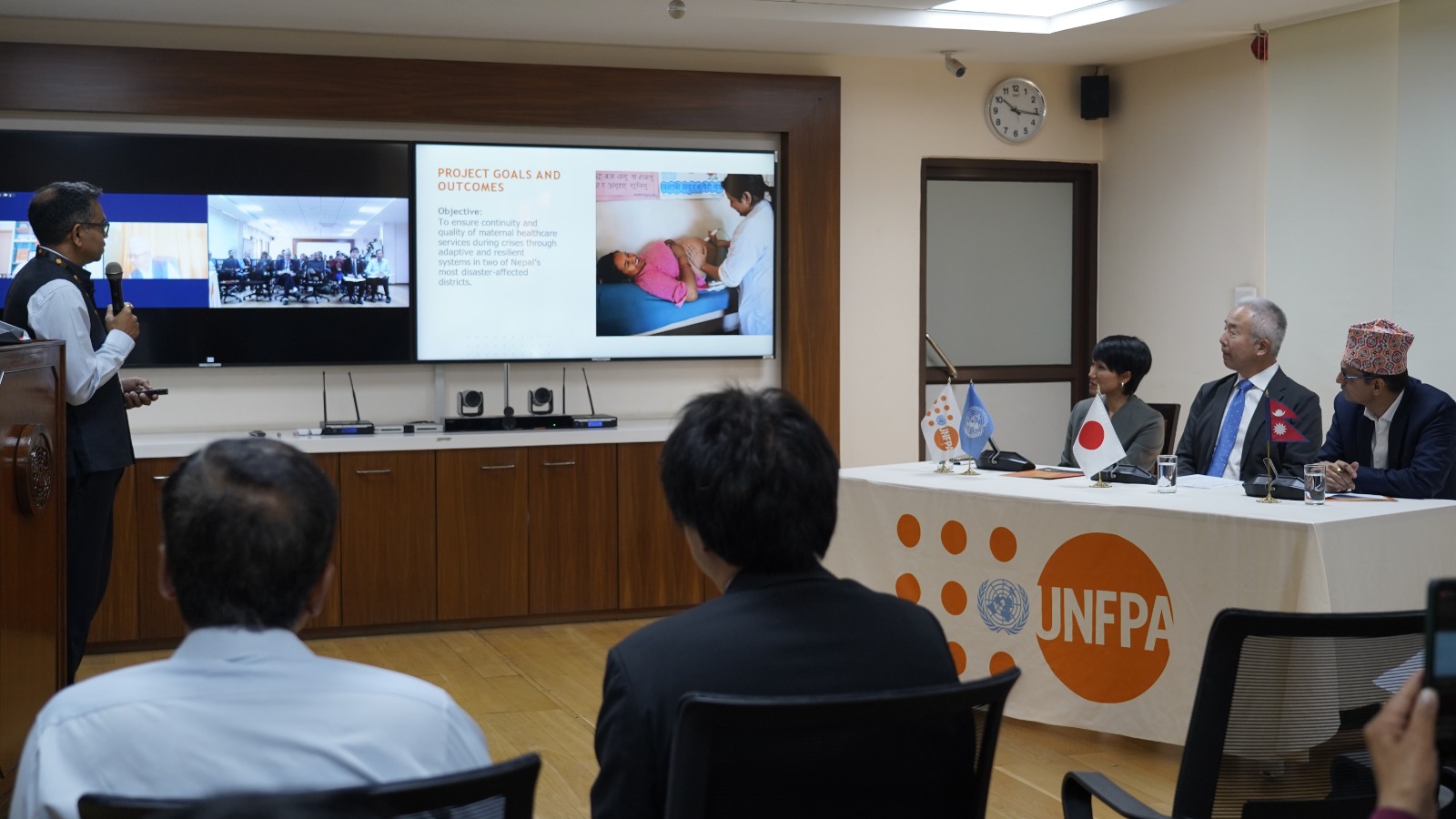Miranda Morton Yap has worked as a facilitator, coordinator, producer and organiser in the creative arts for over a decade. She has worked for multiple projects ranging from commercials, short films, stage productions, to booking bands on tours and producing fundraising charity events. Her new film Daughters of the Curved Moon has been selected for screening at this year’s Kathmandu International Mountain Film Festival. The movie, based on a story of a Jumla girl’s coming of age, will be premiered at the event, which is to start next week. Onlinekhabar caught up with Yap to talk to her about the movie, and her experience producing it. Excerpts:
So the movie is a about a girl from Jumla who wants a life different from that of her mother. Are we right in saying that?
She is a girl from Jumla, but at the beginning of the movie, you would see that she no longer lives there, she’s coming home from Pokhara. The movie is about how the girl is trying to bring change to her village, change in the attitude of her villagers. As you know, there are lots of customs in Western Nepal that are related to women. For example, the chhaupadi, the custom that women who are not married are not supposed to spread cow poo on the field or plouhg. She is here challenging these things, she’s asking why can’t I do this work.
She’s already not like her mom. She’s implementing change within her family and the village, coming of age. She is not like any other girl from Jumla. She’s moulded herself to become a role model of sorts for other Jumli girls, who look up to her.
Daughters of the Curved Moon from Sophie Dia Pegrum.
Is it because she’s been to India a lot of times with her dad, who worked there?
He (her dad) treated her like she could do anything. That’s not the norm in Nepal, not even in modern areas. The gender roles are similar wherever you go. So one of her family associates runs an apple farm in Shimla. Even at 17, she would go to Shimla with men from her village to get them work in the farm. The men would not know anything, and this teenage girl knew everything about getting to Shimla. She’s very capable.
Do you remember the first time you met Nisha Budha, the main character of your movie?
In 201o I was in Jumla for a week to organise a training course for local women. After spending a week there, I went back to the UK and Sophie (the co-director and the editor of the film) was in the US. I told her I would like to make a movie in Jumla someday. I told here I would go back a few times, learn the language, and then think about the movie. But she insisted that we get started at the earliest, and bam-bam we were back in Jumla in 2011 scouting for our story. So in 2011, we went back to Jumla, this time we were at a different village. Nisha also participated in the training course. I knew she was different. We had an immediate click, we hit it off. We were like family, she would stay in my room, help us with the scouting. We spent 2-4 days scouting for possible stories, and Nisha helped us interview the villagers.
So your would-be lead character was walking with you all along, and you were scouting for a story?
Yea. We didn’t know she could become our lead character. Even during the first few shoots, she was interviewing people in the village, working as the production assistant. As things progressed, looking at her, it made sense to have her as the main character because she tied it all together. We didn’t know that in the beginning.
Could you describe Nisha for the audience?
She is an extraordinary young woman from Jumla. She is industrious and does not abide by the restrictions placed on her. Her charm is irresistible. She’s devoted to what she’s doing, she’s my baini.
So when you arrived in Jumla with your camera, you must have told the villagers, okay we are here to shoot a movie, this is our camera, please assume we are not here. We’ll show it to you after we are done.
Yea, pretty much. We had this meeting on the high street, that’s what we told them. I am looking forward to going back to screen the movie there, hopefully, everyone will love it.
During the shoot, how did the people react to the camera, we’d presume that they are not used to having cameras around them. How did they feel ?
You say that but around one-and-a-half years ago I came across a documentary made by a French woman. It was set in the same village, and some scenes were shot inside Nisha’s kitchen! We were saying this place is like ‘Jollywood’ (the Hollywood of Jumla).
How did the people react to the camera?
The thing is that we were there on four different occasions. They got used us. The first time, they would stop and stare, the kids were always staring. After a while they got used to us, and carried out their life as normal. By the fourth shoot, people were very comfortable. This could be because Nisha and our production manager Saroj were both from the same area, and they knew the place well.
You have been like an elder sister to Nisha. Do you think, your presence in the village had an impact on the her. Would her life be the same without you?
That’s a difficult one. I think her life course would have been the same. I have had emotional and psychological effect on her, but she would have done the trekking guide training even without me. She would have taken a different route, but she would have reached the place she’s in now. At a level, I believe, we’ve changed each others’ lives.

Nisha Budha. Yap says: “She would have taken a different route, but she would have reached the place she’s in now. At a level, I believe, we’ve changed each others’ lives.” Photo: Shakti Pictures.
How did she have a impact on your life?
Well, she’s helped a lot during the film-making process here in Nepal. She’s not just the main character, she’s my personal assistant she’s the production assistant, the translator, and so many things.
As a storyteller, is it necessary for you to be objective, remain detached from the subject? Because here, we see that the main character of your film has a personal bond with you.
The film is not an expose of some king. It’s not objective. At one point we were thinking that maybe I could narrate the story of Nisha showing us around her village. We never said it’s not personal. We just want to show the lifestyle of these people, we do not want to force an opinion. It is just an observation. There is no debate or message I want to give.
She was also involved in transcribing and editing. How more personal can it get?
Yea it’s personal. Nisha’s mom hasn’t been to Kathmandu in 34 years. Aama is coming to Kathmandu for the premier.
Well, whenever we hear that a Westerner’s made a film on Nepal, there are a group of people who are bit skeptical about the whole thing. They just see it as an exercise in ‘exoticising’ the local culture. Anything you want to say to them?
Yea, there’s a tendency to treat the subject as a novelty. I think there is some truth in that. But in my case, it’s very personal, I feel like I have a relation with the people, they are not just my subjects. I have hung out with them, we went to Tato Pani together after the shoot. They are my friends and Nisha’s family is my family. It is difficult when the camera is there, it can change things. Foreigners, even without the camera change things. People put on cleaner clothes when you are around. But despite all this, I think we managed to achieve some level of authenticity. That’s because of Nisha.
So your movie has been selected for KIMMF this year. What can the audience expect from it?
During our test screenings, we saw that the people in Kathmandu were fascinated to watch the movie. There are many people in Kathmandu who have never been to Jumla before. Sophie (Dia Pegrum) has shot the movie beautifully, and there is lot of local singing. Its is not only for women, it for men as well, for them to encourage their sisters or daughters to reach their full potential. Overall, it will be a good movie to watch.
And what about the title? How did you come up with it?
Well, we quite liked the name, it was the working title of the movie even before the story was finalised. Maybe it has something to do with the curved moon on the Nepali flag. It grew on us as we went on with the film, and we decided to stick with it. I wouldn’t change it for any other title.























